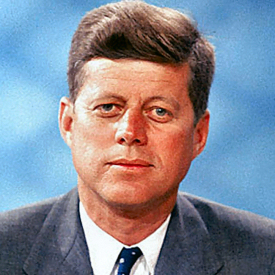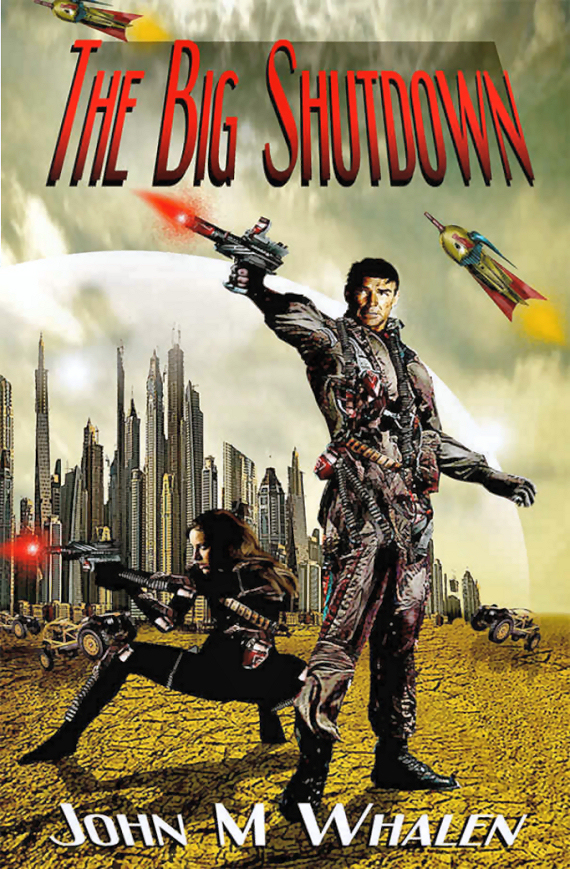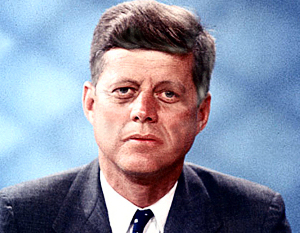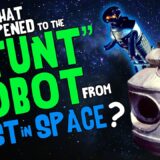
How you feel about John Fitzgerald Kennedy if you’re a U.S. citizen, I think, is mostly dependent upon your age (okay, and a bit on your party affiliation maybe). For those of us who are “baby boomers” and the like, he has attained an exalted, almost saintly aura, but I suspect that for millennials, he’s about as relevant and exciting as, say, Abraham Lincoln. I remember all the hype leading up to his election in 1960; the Republican stance was that he was young—the youngest President ever, so far—and “inexperienced/untried,” and besides, he was a Catholic. Millennials may not believe how significant that was at the time; it was a very divisive thing. Richard Nixon was hyped as a good choice because he had been Dwight D. Eisenhower’s Veep; they were positioning him as experienced, sober and stable—and *not* a Catholic! It was a fairly acrimonious race, but for SF/F readers it was the real beginning of the Space Age (the “space race” had begun earlier when Sputnik was launched, and we were told we couldn’t let the “Russkies” beat us into space. But Kennedy promised us we would “choose to go to the moon… and do the other things” (though he never really said what those “other things” were) which meant we’d get there first. Seriously, if you didn’t live through all that Cold War paranoia and propaganda, you’d find it hard to believe! And maybe, just maybe, if JFK had lived, we wouldn’t have gotten enmired in Viet Nam; although we had “advisers” on the ground, it took Lyndon Baines Johnson to escalate it to the status of a war. Maybe. And maybe not—and that’s what 11/22/63, by Stephen King, is about. Maybe. We’ll get into that more in a bit.

Longtime readers of this column (hey, it’s been three years; isn’t that long enough to qualify as “longtime”?) will remember I reviewed John Whalen’s Vampire Siege at Rio Muerto, with Mordecai Slate, about a year ago. Well, he’s got a couple of newer ones, and I’m going to do the one that’s not a sequel to the Mordecai Slate book. Although the book’s been published before by a different publisher, it has been revised and retitled from its original title—Jack Brand; and it’s called The Big Shutdown. (Because it’s a collection of short stories about the main character, Jack Brand, that were originally published in an online magazine called Raygun Revival, which has apparently ceased publication (at least, I get a “Page Not Found” error when I go to their website). Anyway, this is a book that should gladden any “Golden Age” nostalgic’s heart: it’s basically a “Space Western.”
It uses many of the tropes of Golden Age SF, when sci-fi was really sci-fi, instead of this pale, insipid PC stuff full of characterization and good writing and pholiosophy [sic] that’s passed off as sci-fi today. Seriously, there is some pretty good pulpish writing here—nothing deep, but with the occasional trenchant comment on Life, the Universe and Everything, but not so much that it gets in the way of the action. The hero, Jack Brand, is a Strong, Silent type who used to be the planet Tulon’s equivalent of a lawman—working for Tulon Central Security—although he retired a few years ago and now just goes around the planet working for hire (always on the Right Side of the law, mind you) and having adventures. Tulon is one of those frontier planets that came to be developed because it had vast, untapped deposits of oil—and the civilized worlds depended on oil and gas. So a kind of cross between the Wild West and the oil boom towns of, say, Texas in the ‘30s came into being. Until some braniac back on Earth developed a new power source: Digital Atomic Energy. And oil was on its way out, which turned into the Big Shutdown for Tulon, because the Powers That Be mandated that Digital Atomic Energy was to replace oil.
Jack and his sister Terry, who also worked for Tulon Central Security, ran afoul of a troupe of Nomads, bike-riding good-for-nothings that inhabit the vast desert wastelands of Tulon, raiding settlements and generally behaving like, oh, I dunno, maybe movie biker gangs. Anyway, Brand was knocked out and his sister kidnapped and he’s spent something like seven years trying to find her.
And the search for his sister is in the back of every adventure Brand has, whether it’s fighting deadly Jack-yenas, scorpion-pedes, snakes, or other animal life on land, or water-based life in the lost underwater city of Nemuria, or bandits, Nomads and other predators. Wearing Krylor calf-length boots, with his trusty Beretta Electro-pistol Velcroed to his side and his radium torch in his pocket, Brand rides his Hover-Jeep (sometimes a Nissan Strato-Sled) across the wastes of Tulon in search of his sister and adventure. As you can tell from the description, Whalen has taken many of the things they used to fill stories with in the ‘fifties, and made a space Western that fans of Max Brand and fans of early SF can both enjoy.

About five years ago, Stephen King wrote a book about the day JFK was assassinated. Well, it’s partly about that, and partly about time travel. It was a good read, even if I’ve forgotten most of it. Well, here it is, 2016, and Hulu has made a TV series about that book, starring James Franco, and retitling it 11.22.63, which isn’t a big change—but it was done so they could use that red dot (simulating a laser sight, which didn’t exist in 1963) in the title. According to Publishers Weekly, the makers of the series intend to hew fairly closely to the book—which is not a guarantee of success, when it comes to Stephen King novels; look at the abomination that Under The Dome became on TV. They had some pretty good actors in that one, but diverged so wildly from the book that the show became incomprehensible. One thing the series is doing is compressing time (not the same as time travel; I’ll explain in a minute). The first episode, which I’ll talk about here, aired on Feb. 15.
Basically, in the book (and the series), our protagonist, Jake Epping (Franco), is a teacher in Maine (where else? It’s King!), who teaches adult education among other things. He likes to eat in the diner run by Al Templeton (Chris Cooper), where he can get a “Fatburger” for the unbelievable price of $1.25. The diner, however, is closing after being in business for 25 years. Jake is in the throes of a divorce—in the book, his wife is a recovering alcoholic; in the TV show we (so far) know nothing about her except her name, Christie, and the fact that she brought divorce papers to the diner for Jake to sign. That same day, between the time Al brings Jake’s burger and the time Jake finishes eating, Al comes back to the table and seems to have aged years in the last ten minutes.
He is also unshaven and is coughing up blood; Jake asks “What the hell, Al?” Al locks the front door of the diner and takes Jake into the back, and asks him to walk into the closet. After a little persuasion, Jake agrees, and after he walks into the closet, finds himself sprawling on the ground in the sunlight, and it’s 1960, not present-day Maine. Basically, for reasons never explained (at least in the TV show; there’s kind of an explanation in the book), the pantry/closet is a “time portal” that takes you back to a specific day and time in 1960 (1958 in the book); every time someone goes back, whatever changes have been made to the timeline are reset. And when you come back to present day, even if you’ve been in the past for years, it’s always only a few minutes past the time you went in. (The townspeople think Al’s been selling cat meat, they call his Fatburgers “catburgers,” but he’s been buying ground beef in 1960 for 30 cents a pound!)
Al has a theory—he thinks that if he can stop the Viet Nam war, the various race riots, the assassinations of Robert Kennedy and Martin Luther King if he can just stop Lee Harvey Oswald from shooting JFK at Dealey Plaza in Dallas, Texas on November 22, 1963. But since Al is now dying of cancer—during those ten minutes he was gone, he lived for four years in the past and his smoking caught up with him—he wants Jake to take over, go into the past and, after making sure that Oswald actually shot Kennedy, to kill Lee Harvey Oswald and make the world a better place. If JFK were still alive in 1968, Bobby wouldn’t have run for president, Sirhan Sirhan wouldn’t have shot him, and the whole butterfly effect would make major changes for the better in our world. It’s an interesting theory. (Figure 3 shows what I think JFK might have looked like if he’d served two terms in office.)
The TV show seems to, as said before, follow the book except for a few changes made because you can’t ever translate a book exactly to TV or film. And the “past time” episodes take place a lot faster—”compressing time”—in the series than in the book. But I wonder whether people who didn’t live that time can understand exactly why Al or Jake are trying to do this. I imagine to people in their 20s, the Kennedy assassination must seem as distant as the Garfield one; do they even care? I will be interested to see how well this translates during the next seven episodes. Right now, the most interesting things so far in this series are the cars! (One of my big beefs about period pieces in movies or TV is that the cars are invariably shiny and new-looking. There’s never a junker or a filthy car seen onscreen. This one’s the same.) Jake buys (with 1960 dollars) a shiny yellow-and-black Ford Fairlane convertible for $700 and change; one of the semi-major characters drives a marvelous silver Thunderbird convertible, and so on. Some of these new-old cars are fabulous, and maybe a reason in themselves to keep watching!
Stamp addendum: I received the following email from Gordon Van Gelder about my stamp column last week: “Concerning stamps, you’ll note that I started pushing for stamps of SF writers (particulary Asimov) more than ten years ago: https://www.stampnews.com/stamps/stamps_2004/stamp_1136410075_14297.html
I’d still like to see it happen.”
You can actually suggest stamps yourselves, or start a petition of your own, folks. Asimov and other SF writers are still viable candidates, although maybe we can winnow the list down from 60 and make it work.
Comments on this week’s column are welcome. It’s free to register here, or you can comment on my Facebook page, or in the several Facebook groups where I link to this column. You can also sign up here to get a notification when I publish a new one. All comments are welcome, whether bouquets or brickbats. Discussion of different viewpoints can be fun! My opinion is, as always, my own, and doesn’t necessarily reflect the views of Amazing Stories or its owners, editors, publishers or other columnists. See you next week!











1 Comment